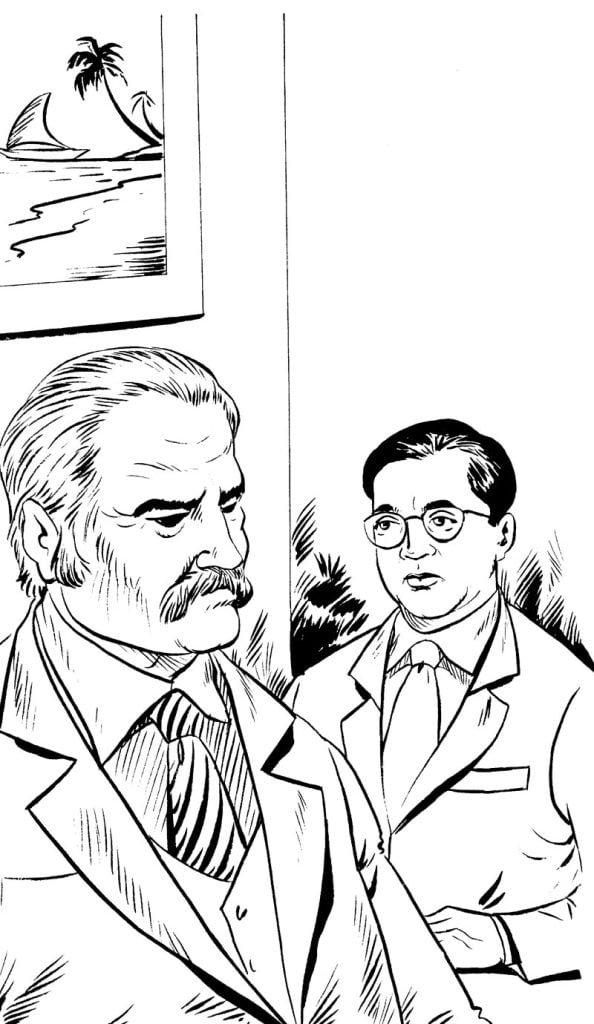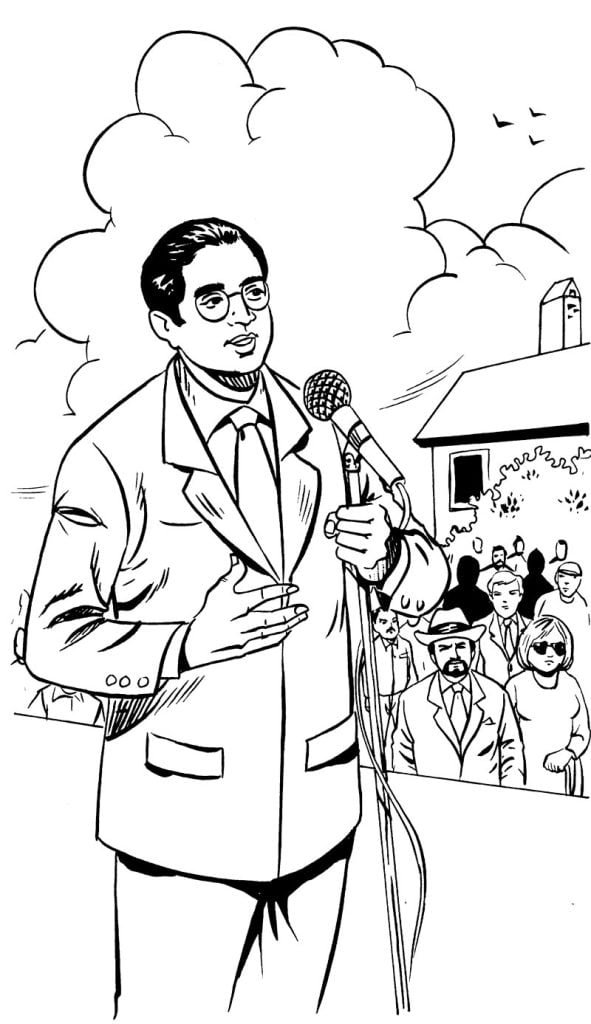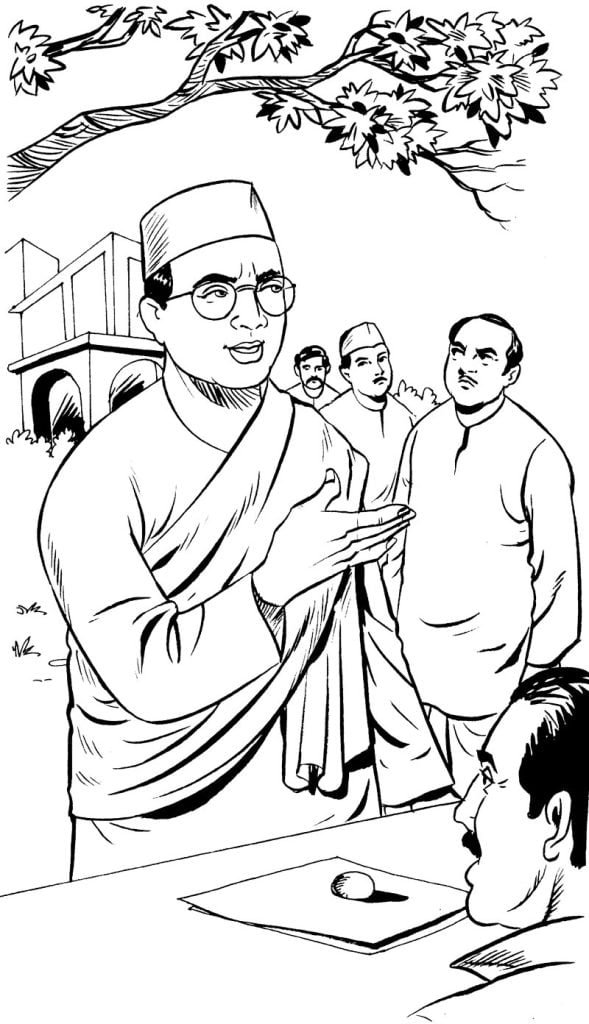Subhash stayed in Europe for four years. His health slowly improved. At the same time his political activities continued. He visited several countries and explored new possibilities in respect of the freedom of India beyond Congress politics.
The world had drastically changed politically and economically. After Bolshevik revolution Russia had become a socialist state. Stalin was ruling it with an iron hand. In Italy Mussolini had established his fascist rule.
After the defeat in the First World War Germany was in a bad shape and had struggled for years. In 1933 Hitler arrived on the scene and had become dictator of Germany.
Subhash reached Italy on 6th March, 1933. The Indians living there and the journalists gave a rousing reception to Subhash. He propagated the case of India’s freedom there.
During that time the elder brother of Sardar Patel, Vitthal Bhai Patel was living in Switzerland. In Swaraj Party days Vitthal Bhai had served as the chairman of the Central Assembly. Subhash met him when he visited Switzerland. Mr. Patel introduced Subhash to the Irish leaders who had fought a long battle for the freedom of Ireland. Subhash stuck close relationship with those leaders.
He returned to Vienna again. Subhash and Patel had agreed that some of the policies and actions of Gandhiji were not beneficial for the independence prospects of India. Subhash issued a statement—‘According to my opinion Mister Gandhi has failed as a politician leader. The biggest proof of his failure is the postponement of the Civil Disobedience Movement. The Congress needs to be reshaped with new policies and programmes. A new dynamic leader capable of reforming the party should be elected.
To the question of a journalist he commented, ‘‘Gandhiji is now like an old furniture. He had served the country well for a period. But now he is a hurdle in the way of the freedom.’’
He explained that the policies of Gandhiji were focussed on one point only ‘non-violence’. A correspondent wanted to know if he could liberate India through armed struggle.
He confidently replied, “We can sacrifice our lives for the independence. Our people are capable of waging a battle.”
Subhash met several rulers of the European countries and pushed the cause of the freedom of India. He studied the political situation and public welfare laws enacted in those nations.
When Subhash met Mussolini the later asked, “Do you believe in revolution or the reforms?”
‘‘I believe in revolution.’’ Subhash said unhasitatingly.
Mussolini smiled. “Then India’s freedom is inevitable.”
During his Vienna sojourn Subhash wrote a book tilled ‘The Indian Struggle’. It came out in November, 1934. In preparing this book Miss Emily Shenkil, the daughter of his Private Secretary rendered valuable assistance.
Then, he received the news of the serious illness of his father, Janakinath Bose. He at once left for India to be by the side of his father. But his father passed away while he still was in Karachi in transit. He took part in the last rites. Soon after he was again transported to Europe.
There was an impression in Europe that Indians were lazy and good for nothing because they were letting the British exploit them without rising up in revolt. Subhash Bose did his best to erase this impression.

He met the leaders of various prominent political parties and discussed how India could hope to get their support for its independence struggle. He wrote articles and delivered speeches revealing the British tyranny and exploitation.
In the mean time Jawahar Lal Nehru arrived in Switzerland for the treatment of his ailing wife Kamla. She was admitted to a Swiss hospital. Subhash met Jawahar Lal Nehru. They held long discussions on the political situation and the future prospects of India. The two leaders were together when Kamla Nehru breathed her last on 24th January, 1936.
Subhash was itching to return to India. His friends and supporters were inviting him back home. But Jawaharlal thought that he should stay back in Europe for some more time for the sake of his health. But Subhash was ready to take a risk.
So, back home, Jawahar Lal Nehru announced the impending return of Subhash in March, 1936.
But Subhash was arrested as soon as he landed in Bombay. His arrest raised a storm. Jawahar Lal Nehru condemned the act of authorities. All over the country protest demonstrations were held.
In view of the public anger Subhash was removed to Kursiang Hills and kept under house arrest in his brother’s home. He was kept there for seven months. His health suffered. Then, he was shifted to Calcutta Medical College. His condition worsened. The pressure for his release was increasing.
At last, he was released on 17th March, 1937. Subhash was asked to stay away from the politics.
He went to Dalhousie for recuperation. After recovery of health he returned to Calcutta to live with his brother. He felt mentally restless.
He could not help attending the Congress session when it was held in Calcutta. Then, he left for Europe on 18th November 1937.
There, he wrote a book ‘An Indian Pilgrim’ in ten days. During his previous visit while preparing the earlier book he and Miss Shenkle had come closer. They had fallen in love. The two got married according to Hindu rites. The couple spent one month in marital bliss.
He could not spend more time with his wife as duty to the country was calling him. On 8th January, 1938 Subhash left for England. Meanwhile, the Congress party had elected Subhash Bose its ‘President’ in his absence.
The news elated and enthused Subhash. He spoke—‘The problems of India don’t belong to India only. They are world problems. The leaders of the world should accept it. India is in touch with the revolutions happening around the world. The solutions to India’s problems will be applicable to the suffering people in other countries.’
In England Subhash met several leaders in buoyed mood. All the English leaders were mightily impressed with the personality of Subhash. ‘Manchester Guardian’ wrote—‘No praise will be enough for the cheerful and calm nature of Subhash Chandra Bose.’
Subhash came back to India on 24th January 1938. Congress workers accorded him a rousing reception when he reached Calcutta. The Congress Session was being held in Haripura in Gujarat. Sardar Patel was organisng the event. A temporary town named Vitthal Nagar was coming up. It was to pay tribute to Vitthal Bhai Patel who had died some time back.
Subhash reached Bardoli by train where Sardar Patel received him. From the railway station he was taken to Haripura in a flower bedecked car. On the outskirts of Haripura Subhash was beseated in a chariot and taken to the venue in grand procession.
Subhash in his inaugural address gave the longest speech of his life which was applauded by the young Congressmen again and again as he dwelt upon progressive policies and outlook. He was magnanimous in admitting that to solve the basic problems of the country the presence of Gandhiji was needed.
Bringing Subhash Bose back to the centre stage of the national politics was the idea of Jawahar Lal Nehru. He had proposed the name of Subhash Chandra Bose.
During his tenure Subhash encouraged the aggressive policies against the British rule. He was not too keen to push the spirit of non-violence. It was not to the liking of Gandhiji who suspected that Subhash was militarising the Congress party.
Subhash wanted to run for the another term. It alarmed Gandhiji. He thought that keeping Congress too long in the care of volatile Subhash would destroy the basic values of the party. So, he consulted his supporters. They first decided to make Maulana Abul Kalam Azad their candidate for the presidentship. When he refused Pattabhi Sitaramayya became their choice.
Some senior leaders requested Subhash to withdraw his name in favour of Sitaramayya who was Gandhiji’s choice. Subhash Bose refused.
In the contest Subhash Bose defeated Sitaramayya by a huge margin. The defeat of Sitaramayya was the defeat of Gandhiji. He regretted the defeat and asked Subhash to form the working committee of his choice.

Subhash said, “Gandhiji is one of the greatest persons of our country. It would be unfortunate if I failed to win his confidence. On my own I will try my best to do so.”
On 22nd February, 1939 all the members of the working committee resigned. Jawahar Lal too refused to support Subhash Bose.
Tripura Session of Congress was held in great tension. Gandhiji and his group boycotted.
When Subhash reached Tripura he was running high fever. The Subjects Committee of the party passed a resolution demanding that the Working Committee should be constituted as per the wishes of Gandhiji and the policies and the programmes of the party must be kept on course.
Subhash tried to make peace with Gandhiji but the old man did not relent. In such unfavourable situation Subhash Bose had to resign from the presidentship.
Inspite of all this the spirit of Subhash did not die. He formed a separate group named ‘Forward Bloc’ within the party. It had four basic aims—The first was to push Congress programmes towards left. The second was to warn the British government. The third was to take advantage of the changing political equations of the world. The last aim was to make India a socialist republic after gaining freedom. Subhash brought out a paper on it. Forward Block organised nationwide rallies to propagate its aims and objectives.
These activities angered the Congress hierarchy. It accused Subhash of indiscipline and ruled that Subhash Bose will be ineligible to be member of any elected committee of the party for three years and he will not remain president of the Bengal Congress Committee.
Rabindranath Taigore did not like it. He requested Gandhiji and Jawahar Lal Nehru to reconsider the punishment meted out to Subhash.
Meanwhile Second World War broke out.
The Viceroy of India declared war on Germany. The Congress leaders protested against the declaration saying that the Viceroy had no right to drag India into the war.
Gandhiji said that the decision not to cooperate with the government in its war effort was party’s policy. He made it clear that personally he was with Britain and France.
Congress party offered to support the war effort if Britain agreed to grant freedom to India after war. The government turned down the offer.
Subhash had his own views. He thought that Britain was in difficult situation and it was time to take advantage of it by hitting back at British rule. He went around the country telling everyone that Indian should not miss the golden opportunity to throw out British.
He was so eager that he met Gandhiji and urged him to start a nationwide movement against the British who were already on the back foot. Gandhiji did not agree.
Subhash went to Calcutta to start his own war against the colonial rulers. He declared that he would break Hall Well Memorial to begin with on 3rd July, 1940.
The authorities moved quickly and Subhash was arrested and put in jail. The life sentence clause was applied in his case. The rulers were trying all kinds of tricks to keep Subhash in jail on some excuse or the other. Many earlier cases were being revived against Subhash.
Subhash wrote a letter to the Governor of Bengal which read—‘If the nation is to live the person must die. I want to die for the independence of my country.’
On 29th November, 1940 he began a hunger strike. Only a couple of days later his health showed signs of deterioration. The death appeared to be stalking him.
The death of Subhash was a frightening prospect. It could result in widespread public unrest and rebellion which the government could ill afford at that juncture.

Subhash was released from jail and allowed to shift to his parental house of Calcutta. There he was kept in house arrest conditions.
From his house Subhash wrote letters to Gandhiji about their relationships. There was some bitterness, some unspelled complaints and admissions. There was also a tone a regret.
Gandhiji responded—‘Our goals are one but our ways are different’.
Inspite of differences Gandhiji admired the self confidence of Subhash. Once he had said—“Young Subhash cant’t be bound in any shackles. But he is very logical. His own rationale controls him. He is as liberal as I am. After expulsion from Congress if he leads any non-violent struggle you will find me following him.”
The trial of Subhash had began. But his lawyer had been successful in getting the hearing postponed citing ill health of his client.
Subhash was seriously thinking of leaving the country as he had come to believe that the authorities won’t let him out and he had little hope of getting support from Indian leaders. He was considersing other options like joining the forces that were waging war against England.
Subhash sent a message to the leftists to join his Forward Bloc. But the leftists were reluctant to leave their parties. All the leftist forces were functioning on parallel lines in small groups.
Now Subhash stopped meeting outsiders. He stayed indoors out of sight. It was revealed that he was keeping himself in solitary confinement of his room for spiritual reasons. The rumour was that he was bedridden. Some others claimed that Subhash had gone into religion and had started reading scriptures and doing worship.
He had stopped shaving. No one was allowed in his room. The food was supplied to him through a window. His room was supposed to be a mysterious confinement.
Infact, Subhash had worked out a plan to leave the country. All the preparations had been made by the approach of the month of January, 1941. The D. Day was closing in. All was set.

